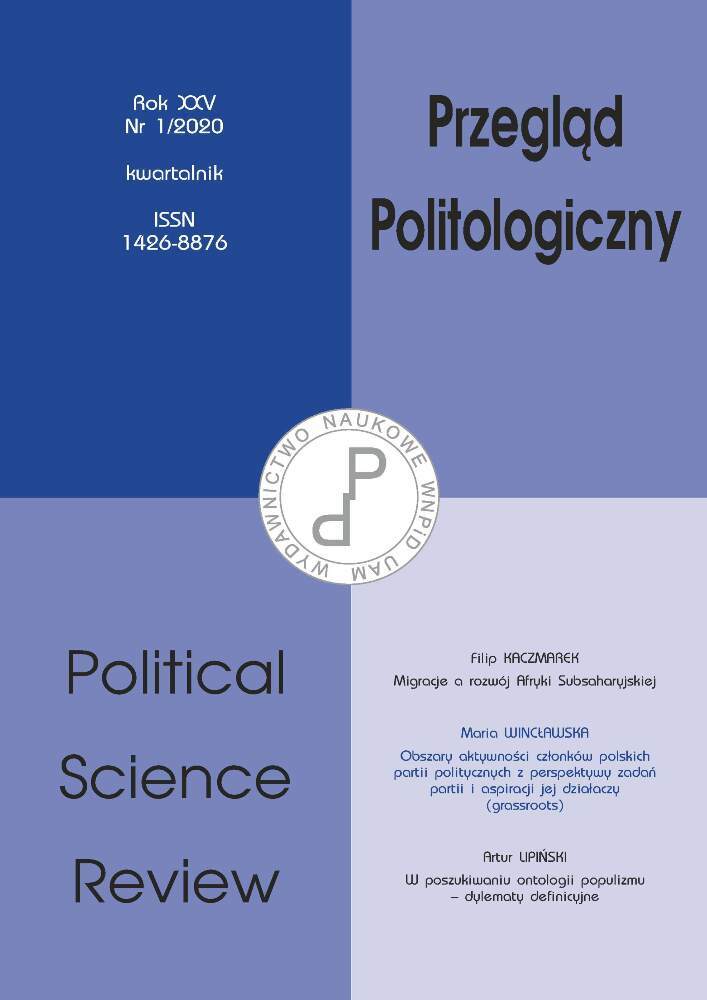Abstract
The paper discusses relations between political mobilization, security and political relations. Security is understood as a social phenomenon, clearly explained by Clausewitz in his book On War. According to Clausewitz, political relations are of key significance for understanding the phenomenon of security. This thesis is not challenged, however, it is necessary to explain why political relations are necessary.
The paper consists of four parties. The first part explores security and its evolution from a historical perspective. The second part analyses relations between a war and political mobilization. In our opinion, war is something more than simple continuation of politics by other means. Part three discusses the personal security, which was not a priority for the states. The problem of security appeared in its complex form only when people became ready to fight as a result of political mobilization, and with the creation of stable political organization. Section 4 describes political security and its consequences.
We conclude that the product of the global political mobilization is polyarchy which principally changes the problem of social and political security. Within the framework of regional polyarchy the system of security of states in the area occupied by it is possible. As a result of creating a global polyarchy the universal system of security has become real. The role of army has changed and to an ever decreasing extent fulfils the function of a traditional army. Mercenaries lost their importance (however, not completely) and later also the military troops acting on behalf of the state.
References
Algaze G. (1993), The Uruk World System: The Dynamics of Expansion of Early Mesopotamian Civilization, The University of Chicago Press, Chicago.
Bloch M. (1998), Królowie cudotwórcy. Studium na temat nadprzyrodzonego charakteru przypisywanego władzy królewskiej, zwłaszcza we Francji i w Anglii, Wydawnictwo Bellona, Warszawa.
Clausewitz C. (1976), On War, Princeton University Press.
Creveld M. (1999), The Rise and Decline of the State, Cambridge University Press, Cambridge.
Fukuyma F. (2006), The End of History and the Last Man, Free Press, New York.
Howard M. (1990), The Franco-Prussian War. The German Invasion of France, 1870–1871, Routledge, London–New York.
Johnson A., Earle T. (2006), The Evolution of Human Societies. From Foraging Group to Agrarian State, Stanford.
Kantorowicz E. (2007), Dwa ciała króla. Studium na temat nadprzyrodzonego charakteru przypisywanego władzy królewskiej, Wydawnictwo Naukowe PWN, Warszawa.
Liverani M. (1995), The Deeds of Ancient Mesopotamian Kings, in: Civilization of the Ancient Near East, ed. J. M. Sasson, Charles Scribner`s Sons, New York, pp. 2353–2366.
Livi-Bacci M. (2007), A Concise History of World Population, Blackwell Publishing, Malden.
Maul S. (1999), Der assyrische König – Hüter der Weltordnung, in: Priests and Officials in the Ancient Near East, ed. K. Watanabe, Universitätsverlag C. Winter, Heidelberg, pp. 201–214.
Michalowski P. (1993), Memory and Deed: The Historiography of the Political Expansion of the Akkad State, in: Akkad, the First World Empire: Structure, Ideology, Traditions, red. M. Liverani, Sargon, Padova, pp. 69–90.
Michalowski P. (2010), Masters of the Four Corners of the Heavens: Views of the Universe in Early Mesopotamian Writings, in: Geography and Ethnography: Perceptions of the World in Pre-Modern Societies, eds. K. A. Raaflaub, R. J. A. Talbert, Wiley-Blackwell, Malden, pp. 147–168.
Nowak E., Nowak M. (2015), Zarys teorii bezpieczeństwa narodowego, Difin, Warszawa.
Oded B. (1992), War, Peace and Empire: Justifications for War in Assyrian Royal Inscriptions, L. Reichert Verlag, Wiesbaden.
Postgate J. N. (1995), Royal Ideology and State Administration in Summer and Akkad, in: Civilizations of the Ancient Near East, ed. J. M. Sasson, Charles Scribner`s Sons, New York, pp. 395–411.
Reinhard W. (2000), Geschichte des Staatsgewalt. Eine vergleichende Verfassungsgeschichte Europas von den Anfängen bis zur Gegenwart, C.H. Beck Verlag, München.
Saggs H. (1962), The Greatness that was Babylon: A Sketch of the Ancient Civilization of the Tigris-Euphrates Valley, Hawthorn Books, New York.
Skarzyński R., Wajzer M., Staniucha W. (2016), Politics and Vision: Social Evolution and the Origins of the Political, “Social Evolution and History” 15(1), pp. 126–163.
Skarzyński R. (2006), Anarchia i policentryzm. Elementy teorii stosunków międzynarodowych, Wydawnictwo Wyższej Szkoły Ekonomicznej, Białystok.
Skarzyński R. (2010), Powstanie polityki i początki prehistorii stosunków międzynarodowych, “Studia Politlogiczne” 17, pp. 13–34.
Skarzyński R. (2012), Podstawowy dylemat politologii: dyscyplina nauki czy potoczna wiedza o społeczeństwie? O tradycji uniwersytetu i demarkacji wiedzy, Wydawnictwo Temida 2, Białystok.
Van De Mieroop M. (1999), The Government of an Ancient Mesopotamian City: What We Know and Why We Know So Little, in: Priests and Officials in the Ancient Near East, ed. K. Watanabe, Universitätsverlag C. Winter, Heidelberg, pp. 137–161.
Welles S. (2002), The journey of man. A genetic Odyssey, London.
Wheatcroft A. (2000), Habsburgowie, Wydawnictwo Literackie, Kraków.
Zalewski S. (2013), Bezpieczeństwo polityczne. Zarys problematyki, Wydawnictwo Uniwersytetu Przyrodniczo-Humanistycznego, Siedlce.

